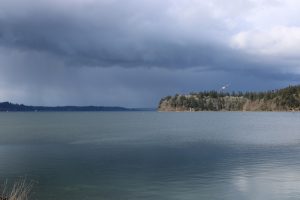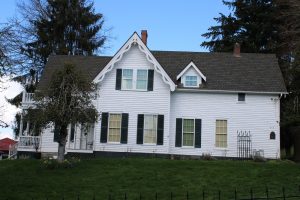The Puget Sound is steeped in history, dating back tens of thousands of years. It is no exaggeration to say Olympia and the surrounding Thurston County areas were molded by this not-so-simple inlet. For such an important aspect of the community, it seems only right that its history is known by as many community members as possible. From melting glaciers and orca whales to irreplaceable Native American tribes and everything in between, here is an abridged history of the Puget Sound.
 The creation of the crisp saltwater paradise started roughly 10 million years ago when a landmass of epic proportions, known as the Okanogan Terrane, rammed into North America. This was important only in the fact that it successfully extended the Pacific Northwest coastline by about 50 miles, leaving room for a future inlet. The act of landmasses smashing into and joining with other landmasses appears to be a recurring theme in the physical creation of the Puget Sound. As stated in a Historylink.org article, it is responsible for the formation of the Olympic Mountains, the bottom edge of the coastline (the Pacific Plate), and the trench of the Puget inlet. The Ice Age marks the last era archeologists predict was devoid of abundant life. The presence of enormous ice glaciers makes thriving for life species extremely difficult, but it is optimal for the creation of canyons, mountains, and more defined trenches. This is exactly what the Puget Lobe (an ice glacier capable of smashing “King Kong” without a second thought) did. Once glaciers began melting, a plentiful land of forest, plants and wildlife began to crop up, helped with the piles of clay, sand and soil left by the glaciers. Once the Ice Age ended, a new era for this promising land began. An era involving the first humans to inhabit the Sound.
The creation of the crisp saltwater paradise started roughly 10 million years ago when a landmass of epic proportions, known as the Okanogan Terrane, rammed into North America. This was important only in the fact that it successfully extended the Pacific Northwest coastline by about 50 miles, leaving room for a future inlet. The act of landmasses smashing into and joining with other landmasses appears to be a recurring theme in the physical creation of the Puget Sound. As stated in a Historylink.org article, it is responsible for the formation of the Olympic Mountains, the bottom edge of the coastline (the Pacific Plate), and the trench of the Puget inlet. The Ice Age marks the last era archeologists predict was devoid of abundant life. The presence of enormous ice glaciers makes thriving for life species extremely difficult, but it is optimal for the creation of canyons, mountains, and more defined trenches. This is exactly what the Puget Lobe (an ice glacier capable of smashing “King Kong” without a second thought) did. Once glaciers began melting, a plentiful land of forest, plants and wildlife began to crop up, helped with the piles of clay, sand and soil left by the glaciers. Once the Ice Age ended, a new era for this promising land began. An era involving the first humans to inhabit the Sound.
First Humans

While the Puget Sound may be called the “Puget Sound” today, the Indigenous peoples knew it as Steh-Chass. It is unclear exactly when the first humans made it to the Puget Sound area, but most scientists agree it was roughly around 12,000 years ago. The evidence gathered on Historylink.org suggests that the beginnings of the first Native American tribes descended from Siberia, entering the region as the glaciers melted. Among these numerous tribes were the Suquamish, Duwamish, Nisqually, Snoqualmie and Muckleshoot (including Ilalkoamish, Stuckamish, and Skopamish). While there is a fair amount of conjecture, one undisputed fact is the essential role this body of water played in the day-to-day life of the Indigenous peoples, and the great care and pride these same people took (and continue to take) in their inlet. The Puget Sound was an integral part of living for the first humans who inhabited the area. They were exceedingly gentle and generous with their surroundings, living a life in which they shared with nature and gave back to the earth. The original settlers were (and continue to be) a group of people with a complex social system known for giving back to their land. Even when colonists arrived in the mid-1800s (bringing with them illness and destruction), they continued to persevere for their land and their ideals.
Settlers, a New Name and a City

Colonists began to appear in the late 1700s. Captain George Vancouver of the British Vancouver Expedition sent a man named Peter Puget and his crew to survey the lower part of the Sound. In honor of his quest, Vancouver ended up naming the region after him. Years later, in 1841, the U.S. Exploring Expedition made their own trip to the waterfront bay, naming it Budd Inlet after a member of the expedition (Thomas A. Budd). According to a City of Olympia article, nine years later the town was officially plotted on a map and dubbed Olympia after the beautiful view of the Olympic Mountains. As the population of settlers began growing, businesses (dry docks, hotels, stores, brickyards and services for summer visitors) began cropping up. Because roads were scarce and trails were covered in forestry, the major form of transportation became steamboats, traveling along a watery freeway. By the mid-1850s, the hub of maritime business was only growing. An attorney and his wife (Daniel and Ann Bigelow) built a house in Olympia that overlooks Budd Inlet still. Today, it’s a museum and one of the oldest buildings in Washington State. To visit, check out the Bigelow House website.
Olympia’s population surrounding the Sound has only grown. Today, the Puget Sound is a place of beauty. In the last few years, there has been a special emphasis on Puget Sound restoration and ocean-life conservation. There is especially a focus on water quality, endangered species and salmon habitat.
Each new day on the Puget Sound brings a world of sea life, saltwater, and magnificent landscapes. Those who have the privilege of living near such a place should not only appreciate the natural wonders close to them, but also treat the Puget Sound with kindness and respect, so it can prosper and grow as its community continues to do the same.
"sound" - Google News
March 16, 2021 at 07:28PM
https://ift.tt/2OEhXr9
A Brief History of Olympia's Puget Sound - ThurstonTalk
"sound" - Google News
https://ift.tt/2MmdHZm
Shoes Man Tutorial
Pos News Update
Meme Update
Korean Entertainment News
Japan News Update


No comments:
Post a Comment